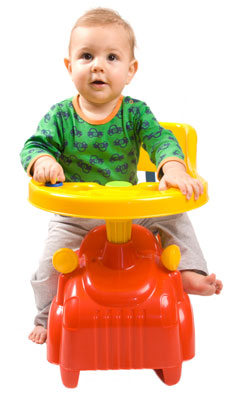What to Expect as Your Child Grows:
Well Child Care at 9 Months
Feeding
 Your baby should continue to have breast milk or formula until he is one year old. Most babies now take 6 to 8 ounces of formula 4 times a day. Encourage your child to drink from a cup now. This is a good time to start preparing for weaning from the bottle at a year of age.
Your baby should continue to have breast milk or formula until he is one year old. Most babies now take 6 to 8 ounces of formula 4 times a day. Encourage your child to drink from a cup now. This is a good time to start preparing for weaning from the bottle at a year of age.- Do not let your baby keep the bottle between meal times.
- You can begin adding table food to your child’s diet. Talk to your doctor about what’s appropriate for your child.
- Avoid honey until one year of age.
Development
- Babies are starting to pull themselves up to stand.
- Soon, they may start to say “dada” and “mama.”
- An important part of discipline now is teaching your child what behaviors you expect. Your primary role at this age is protector for the infant's natural curiosity. During this time, examples you set are much more important than words you may say to your child. Therefore, set an example of the behaviors you expect of your child. Use a description of desired behavior as often as possible, i.e. "Time to sit", instead of "Don't stand."
- At this age, babies learn what "no" means. A critical step in establishing discipline is to limit "no" to the most important issues. Then, when an important issue comes up (such as your baby reaching for the stove), saying, "NO, hot, don't touch" and removing the baby will have real meaning for him.
- Give your baby a choice of toys. Talk to him about the toy he chooses and what he is doing with the toy. Peek-a-boo is a favorite game.
- Avoid the use of TV, computers, and videos.
Sleep
- A regular bedtime hour and routine are important.
- Babies enjoy looking at picture books. You may want to read one regularly with your child before bed. A favorite blanket or stuffed animal may help your baby feel secure at bedtime.
- NEVER put your baby in bed with a bottle.
- Put your baby to bed awake, but drowsy. If your baby wakes up a lot at night, ask your doctor or nurse for advice.
Dental Care
By now, many children have 2 or more teeth. After meals and before bedtime, try to wash off the teeth with a clean cloth. As your child gets more teeth, discuss brushing habits with your doctor.
Safety Tips
- Childproof your home.
- Remove or pad furniture with sharp corners. Keep sharp objects out of reach.
- Store toys on a chest without a dropping lid.
- Check your smoke detector periodically to make sure it's working. Consider using a carbon monoxide detector.
- Put plastic covers in unused electrical outlets.
- Keep hot appliances (such as curling irons) and their cords out of reach and turned off when not in use. Keep all electrical appliances unplugged and out of reach, especially in the bathroom.
- Don't cook with your child at your feet. Use the back burners on the stove with the pan handles out of reach.
- Turn your hot water heater down to 120° F.
- Make sure windows are closed or have screens that cannot be pushed out.
- Don't underestimate your child's ability to climb.
- Check the sticker on your child's car seat for its capacity. It may be time to switch to a rear-facing convertible car seat. Follow the manufacturer's guidelines for installation.
- NEVER leave your child in a car alone. Remember to lock car doors when the car is parked at home.
- NEVER leave your child unattended in a bathtub.
- Continuously supervise your baby around any water, including toilets and buckets. Empty all water and store buckets turned over.
- If you or anyone you visit regularly has a pool, now is a good time to have a fence installed. There is no substitute for this precaution.
- Keep all medicines, vitamins, cleaning fluids, and other chemicals locked away and out of reach. Dispose of them properly. Do not keep expired medicines in the house.
- Put safety latches on cabinets.
- Keep your Poison Control number programmed on all phones. The number from anywhere in the U.S. is 1-800-222-1222.
What to Expect at This Visit
- Development and Anticipatory Guidance.
- Children over 6 months of age should receive an annual flu shot.
Next Visit
Your child’s next visit should be at the age of 12 months.


